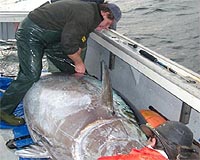 |
Santiago, Chile (UPI) Jan 12, 2009 Chile will launch its first deepwater salmon farming project with a Norwegian loan to try and reverse the low yields on salmon amid constant global demand. The offshore project is the brainchild of a Chilean business group that has been pledged $40 million by Norwegian banks, with the promise it can have access to more funds if the venture takes off. Disease and economic downturn have hit Chile's salmon industry hard over the past two years. Conventional fish farms have reported loss of stocks due to viral attacks and bacteria that decimate fish stocks in great numbers. The new project will involve floating of large rafts at sea with significant numbers of Atlantic salmon positioned at great depths. Officials for the Chilean company, Acuicola Tripanko, said the whole complex could cover 1,300 hectares initially in the Punta Olleta region in southern Chile. "This would be the first experience of its kind in the area, farming salmon in deep and oceanic waters with special technologies and conditions that might avoid disease outbreaks due to strong sea currents," the fishfarmingxpert.com said. The copper mesh cages to be deployed could also help the fight against bacteria, industry analysts said. Currently Acuicola Tripanko is awaiting the results of findings by the public-sector Environmental Impact Assessment System. Acuicola Tripanko CEO Omar Guenul said much was at stake in the project, because it differed greatly from the conventional fish farms. He said the deep-sea construction was designed to address the sanitary issues that have blighted conventional fish farms. The copper mesh cages are said to prevent exposure of salmon to viruses such as Infectious Salmon Anemia and decrease mortality rates in the farms, the Santiago Times reported. Similar systems have been tried and tested elsewhere and currently exist in Alaska, Canada, Scotland and Norway, MercoPress reported. Fish farming is expanding in Latin America, and according to the U.N. Food and Agriculture Organization 45 percent of the fish consumed in the world comes from fish farms. That amounts to more than 50 million tons, but by 2030 the volume would need to double because of the decline in commercial fishing and the increasing demands of a growing population, FAO said. Contrary to popular assumptions, fish farming in Latin America dates back to pre-modern times, and there is evidence that the Maya culture operated controlled fish production in natural pools. Fish farming has grown dramatically in recent years in Brazil, Colombia, Chile, Ecuador, Mexico and Peru, but in Argentina, weather conditions have prevented large-scale fish farming.
Share This Article With Planet Earth
Related Links Farming Today - Suppliers and Technology
 France set to decide on bluefin tuna ban
France set to decide on bluefin tuna banParis (AFP) Jan 11, 2010 French fishermen are urging the government to resist pressure from green groups when it decides on Monday whether to join a global ban on trade of the overfished bluefin tuna. Prime Minister Francois Fillon is to announce whether France is in favour of adding Atlantic and Mediterranean bluefin tuna to a list drawn up by CITES, the convention aimed at ensuring the survival of threatened speci ... read more |
|
| The content herein, unless otherwise known to be public domain, are Copyright 1995-2009 - SpaceDaily. AFP and UPI Wire Stories are copyright Agence France-Presse and United Press International. ESA Portal Reports are copyright European Space Agency. All NASA sourced material is public domain. Additional copyrights may apply in whole or part to other bona fide parties. Advertising does not imply endorsement,agreement or approval of any opinions, statements or information provided by SpaceDaily on any Web page published or hosted by SpaceDaily. Privacy Statement |